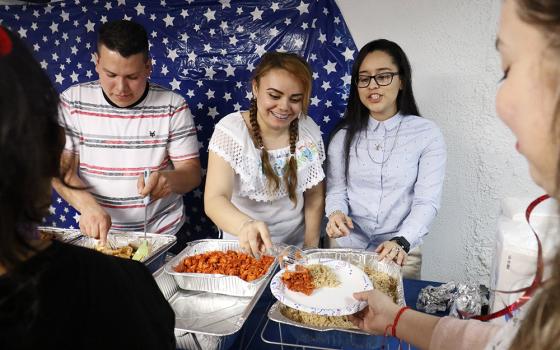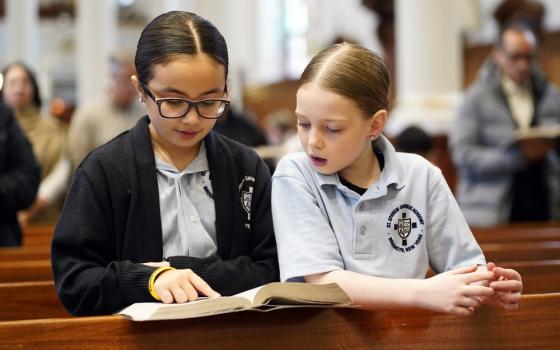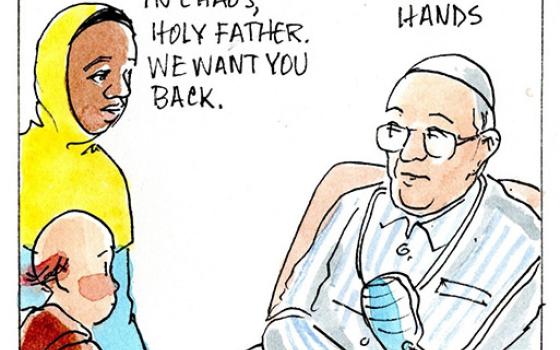By JOHN L. ALLEN JR.
New York
As president of the U.S. bishops’ conference, Cardinal Francis George of Chicago will be a key point of reference throughout Pope Benedict XVI’s April 15-20 visit to the United States. George will also be the figure who leads the American bishops in after-the-fact reflection on what the trip meant, and how it ought to shape their future agenda.
For those reasons alone, George’s thoughts on the significance of the pope’s presence obviously matter.
There’s a further sense, however, in which George may be in a unique position to handicap both the opportunities and the challenges the pope will face. Among the American cardinals, George has a profile closest to Benedict’s own – cerebral, difficult to pin down or to label, and given to speaking in fully formed paragraphs rather than sound-bites. Like Benedict, George has occasionally said things in the course of a complex argument which, out of context, stir the waters. (His 1997 remark that “liberal Catholicism is an exhausted project” offers one example.)
Given that track record, George may also have a special feel for some of the communications hurdles Benedict XVI will face over his six days in America.
I spoke with George about the trip on April 11. Among other things, George said that the pope will find a Catholic church in the United States "chastened" by the sexual abuse crisis, a church with less "hubris," and perhaps for that reason especially disposed to listen.
Pointedly, George added that the American bishops will not go into this visit looking to teach the pope -- a departure, he implied, from some previous encounters.
The following is a transcript of our interview.
How do you think the pope will do in our sound-bite culture?
t
tI think he’ll do very well, assuming that people in the media don’t have a pre-written storyline and then go looking for individual words he says, for sound-bites, in order to corroborate what they’ve already written. If the media people are willing to listen carefully and to explain what he said, to present it in his own terms, he’ll do fine.
How optimistic are you that this will actually happen?
I can’t talk about the media in general. Most of the questions I’ve received so far have been quite predictable, trying to fit the pope into our context. For me, that’s the most important unknown about this trip: Are we willing to allow the pope to come and speak to us from his context? That’s what a pope, as a universal pastor, is able to do, but the question is whether we’ll able to hear it. His context is the whole globe, not just the United States.
The Pew Forum recently conducted a survey which found that 80 percent of Americans, including 63 percent of American Catholics, say they know “just a little, or nothing at all” about Benedict XVI. Do those findings track with your own sense of where Americans are? Why do you think we know so little about Benedict after three years in office?
I don’t know about the numbers. They’re accurate, I’m sure, but I don’t know if they coincide with my own intuitions. I’ve never thought about it.
Assuming they’re right, I think the explanation goes back to your first question. Benedict doesn’t give himself to sound-bites, and he is not very dramatic. Those are the two elements, auditory and visual, that usually capture people’s attention. People who don’t read his encyclicals and his other messages, because they don’t have the time and they’re not readily accessible, obviously wouldn’t have a good grasp of who he is. That’s how this pope presents himself, in those letters and encyclicals. That’s how he communicates.
Will this trip give people a better sense of the man?
People will develop a better sense of him, sure. There will be a lot of conversation, and people will see him more. Americans will come out of this with some impressions, although whether they really know him or not is another question, as it is with any public figure.
How will you measure the success of the trip?
The hoped-for outcome is the strengthening of our own faith in Christ. That’s the hope for this visit, the desire. What would count as concrete evidence of that result? If our conversation in the church after the pope leaves were to become more concentrated upon Christ, and less upon ourselves. Christ is the source of our unity. It’s not a negotiated unity among the various camps in the church. It’s a gift from Christ. If we seem more united, and if we act more united, it would be evidence that the trip was a success.
This will be the ninth papal visit to the United States. Each time a pope comes he finds a slightly different Catholic reality, because the church in this country is constantly changing. Most notably, this is the first papal trip since the sex abuse crisis broke. How will that affect the visit?
Obviously, we’ve been deeply wounded by the scandals that have erupted since 2003. I think we have faced it, and we will continue to face it. We’ve done more than most people know, because from a media point of view, that’s not the story. But we’ve done a great deal to reach out to victims, and to ensure that these horrendous sins and crimes don’t happen again.
We’re a chastened church, certainly the hierarchy is. We bring a little bit less hubris, a little bit less self-righteousness, that sometimes can become a characteristic of the church in this country. In that sense, we’re more open to conversion and what the pope will tell us. I don’t think the bishops are intent upon teaching the pope this time, and that’s something of a shift. We’re quite willing to listen to what he has to tell us. We also know that he appreciates us and the church in this country.
It’s important to say that Benedict comes with his own sense of that crisis. He has read all the case files, and he was profoundly affected by that. He has a deep sense of compassion for the victims, along with a deep sense of how the vocation of the priesthood has been betrayed by these crimes and sins. Of course, he also knows that it’s not all priests. We’re talking about less than three percent nationwide, and he’s clear on that. But he knows each case, and each case is a tragedy.
Do you think there’s any possibility that the pope might still meet with victims?
By now the schedule has been definitively set. In view of the logistics involved and the security demands, I would be very surprised if there are any deviations from it.
The pope has made it clear that he’s not coming to get involved in America’s 2008 elections. But are you worried that various forces might try to “spin” the pope in order to score political points?
That’s a distinct possibility. In the end, you have to trust people to recognize when there’s manipulation or spin going on. To be honest, there’s not much you can do to avoid that attempt being made.
Do you see it as your role to help protect the pope’s message from political spin?
I wouldn’t use the word ‘protect.’ I can try to explain what the pope is saying if that’s necessary, although he’s always clear. Maybe what I could add is a certain sensitivity to the political context, which is something I have as an American citizen. If there is clear evidence that somebody is trying to instrumentalize or manipulate the pope’s message for their own purposes, I would certainly try to step in and clarify things.
The important thing here is context. The pope clearly speaks as a universal pastor. That’s his context, and we have ours. Sometimes context is far more important than the words. If you take only a part of what the pope is saying, then you lose the whole. That’s what we do, sometimes, but it’s certainly not the best way to understand him.
What moments on the pope’s itinerary do you think will be especially important or memorable?
t
tI’m excited about the whole visit. But in terms of specifics, the first highlight for me will be his talk to the bishops [on April 16 in Washington]. That’s going to have a big impact on us and our agenda as we move forward. We will be listening very intently to what he has to say.
After that, the address to the United Nations will be important. That’s where the Holy Father’s global focus will probably be most clear. The public homilies in New York and Washington will also be important. In those instances, the pope will be speaking to laity, and it will give us a sense of how he wants us to preach to our own people.
I also think the meeting with young people in New York will be interesting. It’s an event that he asked to be put on the schedule himself. I think we have some sense of how he’ll approach it from World Youth Day in Cologne in 2005, but this is specifically for our American children. It’s a generation undecided about its personal beliefs. There’s a lot of generosity among young people, but they’re searching.
The Holy Father’s meetings with other Christians, and with Jews, Muslims, and people of other faith, will be valuable, but those relationships are on-going. The real purpose of these sessions is to further strengthen relations that are already generally good here. That’s not to say he won’t break new ground, but in general I suspect their value will be to reinforce what’s already in place.
I’m surprised you didn’t mention the meeting with Catholic educators, which some see as a lynchpin of the trip.
I see it like the meeting with our ecumenical partners. I think the Holy Father will encourage the great efforts in Catholic education that have marked our history in this country. I’m sure he’ll emphasize the importance of the relationship between faith and reason. I expect that it will be an encouraging message.
Also, of course, I’m sure the pope will remind us that for a university to be true to its nature, it has to engage the dialogue between reason and faith and foster it in our general society. The university is a privileged space for that dialogue to take place.



